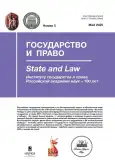Legal regulation of juvenile delinquency prevention activities in the constituent entities of the Russian Federation
- Authors: Sokolov A.Y.1, Zaikova S.N.2
-
Affiliations:
- Saratov Branch of the Institute of State and Law of the Russian Academy of Sciences
- Saratov State Law Academy
- Issue: No 5 (2025)
- Pages: 159-168
- Section: В субъектах Российской Федерации
- URL: https://journal-vniispk.ru/1026-9452/article/view/306961
- DOI: https://doi.org/10.31857/S1026945225050141
- ID: 306961
Cite item
Abstract
The article analyzes the legislation of the subjects of the Russian Federation in the field of prevention of juvenile delinquency. The key issue of the study was the development of proposals for improving the legal regulation of legal relations in this area, and the main objective was to identify contradictions between regional legislation and the Federal Law of June 24, 1999 No. 120-FZ “On the Fundamentals of the System for the Prevention of Neglect and Delinquency of Minors” and the Resolution of the Government of Russia of November 6, 2013 No. 995 “On Approval of the Model Regulations on Commissions for Minors and the Protection of Their Rights”. General (analysis, synthesis, induction, deduction, formal-logical method) and special methods of cognition were used: method of document analysis, comparative-legal method. As a result, typical violations committed by the constituent entities of the Russian Federation in establishing the procedure for establishing and implementing the regional system of commissions for juvenile affairs and protection of their rights include: unjustified expansion of the commissions’ powers; extension of the time limits established by federal legislation for consideration of information about a case involving a minor; establishment of measures of influence applied by the commissions to children and their parents that duplicate measures of administrative responsibility; mixing of certain preventive measures; and, in some cases, the use of administrative responsibility. Regions that have committed violations of federal legislation are invited to conduct legal monitoring to establish the completeness of legal regulation in the area of prevention of juvenile delinquency and to eliminate the identified contradictions. It has been proposed to establish at the federal level the rights of persons in relation to whom preventive work is carried out and the measures of influence applied to them.
About the authors
A. Yu. Sokolov
Saratov Branch of the Institute of State and Law of the Russian Academy of Sciences
Author for correspondence.
Email: aysockolov@mail.ru
135 Chernyshevsky str., 410028 Saratov, Russia
S. N. Zaikova
Saratov State Law Academy
Email: snzaikova@rambler.ru
104 Chernyshevsky str., 410028 Saratov, Russia
References
- Antonova L. B. Commissions on juvenile affairs and protection of their rights: problems in the implementation of powers // Bulletin of the Voronezh Institute of the Ministry of Internal Affairs of Russia. 2021. No. 4. P. 4 (in Russ.).
- Arzhanov V. V. New approaches to the system of commissions for minors and the protection of their rights and the procedure for their formation // Bulletin of the State Law Enforcement Agency. 2023. No. 3 (152). Pp. 85–88 (in Russ.).
- Bezhentsev A. A. The role of commissions for juvenile affairs and protection of their rights in the prevention of juvenile delinquency, prospects for the modernization of administrative activities // Herald of the SPbU Ministry of Internal Affairs of Russia. 2017. No. 1 (73). Pp. 54–58 (in Russ.).
- Belousov S. A. Legislative imbalance (doctrine, theory, practice) / ed. by I. N. Senyakin. Saratov, 2015. P. 460 (in Russ.).
- Vinnichenko E. O. Legal bases of activity of commissions on juvenile affairs and protection of their rights: from collisions of subordinate regulation to the new federal law // Legal science and law enforcement practice. 2013. No. 4 (26). P. 134 (in Russ.).
- Dankova Zh. Yu., Pribytkova A. N. Development of performance indicators of the commissions for minors and the protection of their rights (using the example of the activities of the Commission for minors and the protection of their rights in the Staroe Kryukovo district of the Zelenograd Autonomous District of Moscow) // GosReg: state regulation of public relations. 2021. No. 1 (35). Pp. 22– 28 (in Russ.).
- Ilgova E. V., Zaikova S. N. The functional structure of the automated information system for the prevention of neglect and juvenile delinquency in the Russian Federation // Bulletin of the State Law Enforcement Agency. 2021. No. 5 (142). P. 106 (in Russ.).
- Kolesnikov A. V. Local self-government bodies in the unified system of public authority: separate theoretical and legal problems of status and organizational interaction with the state. M., 2024. P. 105 (in Russ.).
- Sabirov E. R. Restorative approach in the activities of the Commission for juvenile affairs and protection of their rights // Herald of Restorative Justice. 2023. No. 17. Pp. 12– 16 (in Russ.).
- Savenkov A. N. National political and legal development and the main ideas of the philosophy of law in Russia (part I) // Legal policy and legal life. 2024. No. 4. P. 18 (in Russ.).
- Sokolov A. Yu., Soldatkina O. L. Development of a regional model regulatory act on legal information as a direction of legal policy in the field of information security // Herald of Perm University. Legal sciences. 2023. No. 4. P. 612 (in Russ.).
- Khabrieva T. Ya. Constitutional reform in Russia in the coordinates of universal and national // Journal of Foreign Legislation and Comparative Jurisprudence. 2021. Vol. 17. No. 1. P. 12 (in Russ.).
- Shaikova M. V. Activity of commissions on juvenile affairs and protection of their rights (on the example of the municipal formation of Kursk) // Municipal service: legal issues. 2020. No. 2. P. 23 (in Russ.).
Supplementary files










